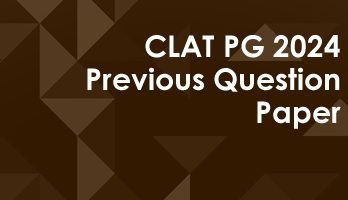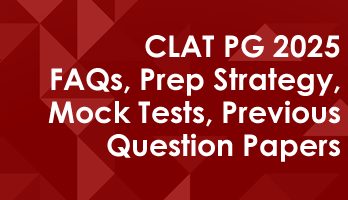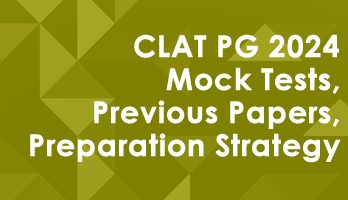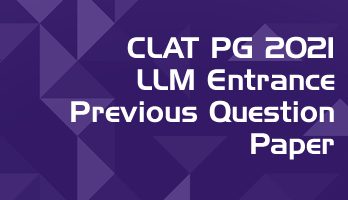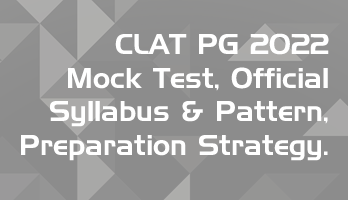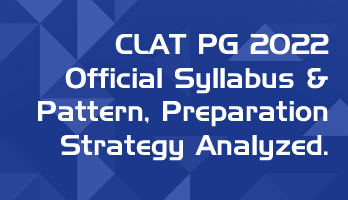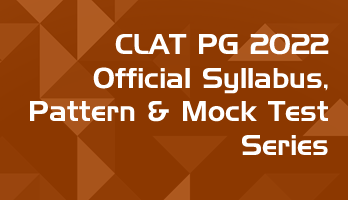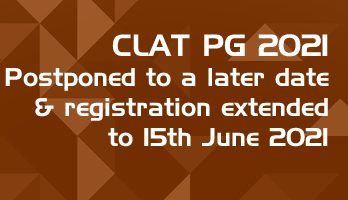- Updated as per latest CLAT PG pattern
- Overall there are 300+ comprehension passages - with 2350+ questions
- 100 passages are provided as stand-alone mini mock tests
- 120 passages are combined to form 10 full-length mock tests
- 2020, 2021, 2022, 2023 and 2024 (New Pattern) Question papers included as mock tests
- Answers include the reason or 'rationale' for better understanding
- Order of the questions and answer choices are shuffled in every attempt for better practice
- The passages are of various lengths and complexities for better practice
- Unlimited access & practice - valid for one year from date of purchase
- Accessible 24 x 7 via Smart-Phone browsers and Desktops
- More the 100 LawMint users were selected by various top NLUs in 2020, 2021, 2022 and 2023 - Including NLSIU, NALSAR, NLU-J, WBNUJS
- Our users were also selected for the IIT KGP LLM, NLU Delhi (AILET PG) & DU LLM programs
Also included in the pack : (Useful for non-CLAT LLM entrance exams) :
- 11 CLAT PG old pattern previous Papers - 2009 to 2019 (as mock tests)
- 50 full-length old MCQ format mock tests (100 questions each)
- 50 old pattern MCQ mini-mock tests (25 questions each)
- Summarized overview of Important Jurisprudence topics (For Subjective & Objective questions)
- Overview of all Constitutional Amendments
- All Tests & Previous Papers are timed and have Negative marking for realistic simulation
- Questions & Answer Choices randomly shuffled in every attempt for better practice
Authentic Feedback from previous LawMint users :
I got AIR 21 in CLAT PG. Thank you so much. Your mocks helped me a lot in my preparation 🙂 - Ayushi Jain
I have subscribed to your CLAT PG program and got AIR 36 in this year CLAT PG. I have also secured AIR 54 in AILET PG exam. I would like to thank you. Your mock paper really helps a lot - Shrashank Tripathi
I would like to thank you for the CLAT PG LLM COURSE. Practising mock tests there helped me in getting confidence and hence I was able to get AIR 45 in CLAT PG LLM - Akshay Awasthi
A year back, I relied on the IIT Kharagpur RGSOIPL mock test series by LawMint to prepare for my RGSOIPL entrance test. Few months back, I relied on your UGC NET Law series to prepare for UGC NET. I was the topper of the RGSOIPL entrance, and have cracked JRF in UGC NET. All thanks to LawMint - Anshuman Sahoo
"I got AIR 18 in CLAT PG and General Category rank 28 in AILET PG. I want to thank you for helping me practice well in controlled conditions from any place. It gave me a lot of confidence and I took the tests while travelling too. I also made it to IIT Kharagpur." - Vinodharani
"Lawmint has been of great help to me in securing AIR 25 in AILET PG and AIR 29 in CLAT PG examinations. The subjective and objective approach of the test series kept me up to date with the latest exam pattern." - Bhawna Nanda
"I, Nimmy Saira Zachariah joined you clat test series. I cleared AILET PG with 30th rank. Your test series were of immense help as it gave me clear idea of where my preparations stand thank you once again law mint." - Nimmy S Z
"Hey guys. Where do I start? If I thought that getting AIR 59 in Clat PG was it, then how wrong I was. With Lawmint now I have cracked UGC NET as well." - Joyanta Chakraborty
This article is a comprehensive collection of Frequently asked Questions and Answers about PSU Recruitment through the CLAT PG LLM 2025 and 2026 Entrance Exam. If you have a question which has not been answered below, post your query as a comment to this article or email us at hello@lawmint.com
These are the PSU that have recruited through CLAT PG in the past and expected to recruit from the upcoming exams aslo.
| S.no | PSUs recruiting through CLAT (CLAT PG) 2025 and 2026 – Expected | Official Website |
| 1 | Bharat Heavy Electricals Limited (BHEL) | Click here |
| 2 | Indian Oil Corporation Limited (IOCL) | Click here |
| 3 | National Thermal Power Corporation Limited (NTPC) | Click here |
| 4 | Oil India Limited (OIL) | Click here |
| 5 | Oil and Natural Gas Corporation (ONGC) | Click here |
| 6 | Power Grid Corporation of India Limited (PGCIL) | Click here |
| 7 | Gas Authority of India Limited (GAIL) | Click here |
| 8 | National Highway Authority of India (NHAI) | Click here |
| 9 | Power System Operation Corporation Limited (POSOCO) | Click here |
| 10 | Mangalore Refinery and Petrochemicals Limited (MRPL) | Click here |
| 11 | National Hydro Power Corporation | Click here |
Which PSU companies recruit Law Graduates through CLAT 2025 and 2026 ?
Is there any PSU in India which recruits a law officer every year ?
Which PSUs are expected to recruit a Legal Post through the score of the CLAT PG 2025 and 2026?
There are several companies which consider CLAT PG LLM Entrance score or rank as a criteria for selecting Legal Officers, Legal Advisors or Executives in their Legal Teams.
Some of the Public Sector Units – PSUs which have been regularly recruiting candidates on the basis of CLAT PG scores and are expected to recruit in 2025 and 2026 are as below.
- Bharat Heavy Electricals Limited – BHEL
- Oil and Natural Gas Corporation – ONGC
- Power Grid Corporation of India Limited – PGCIL
- National Thermal Power Corporation Limited – NTPC
- Oil India Limited – OIL
- Indian Oil Corporation Limited – IOCL
- Gas Authority of India Limited – GAIL
- National Highway Authority of India – NHAI
- Power System Operation Corporation Limited – POSOCO
- Mangalore Refinery and Petrochemicals Limited – MRPL
- National Hydro Power Corporation – NHPC
Can a law graduate get a law apprenticeship under ISRO, ONGC. Etc. through the CLAT 2025 and 2026?
In general, PSUs recruit Law Graduates for full-time and permanent roles such as Law Officers, Advisors or Legal Executives using the CLAT PG scores.
For apprenticeship or internship roles, these companies usually have separate recruitment process. e.g. Indian Oil has a separate section on it’s careers website where all apprenticeship roles are listed : https://www.iocl.com/PeopleCareers/Apprenticeships.aspx
Recently, NHAI announced the recruitment of Young Professionals for Legal Roles through the CLAT PG. Since these roles are on a fixed contract basis, they are more in-line with Apprenticeship.
Yes. BHEL, ONGC, PGCIL, NTPC, OIL, IOCL, GAIL, POSOCO, NHAI, MRPL and NHPC have recruited using CLAT PG 2025 and 2026 scores as one of the selection criteria.
While some PSUs may recruit every year, others may recruit as and when they have sufficient number of Legal Role vacancies.
Looking at the recent trend, every year at least three or four PSUs recruit through the CLAT PG.
Does ONGC recruit advocates with experience only or a fresher may also get a job there through CLAT score ?
As per their official notification, ONGC prefers to hire practicing Advocates, with a minimum of around 3 years of legal post-qualification work experience. However, there is no specific cut-off for the experience level mentioned in their notification.
Candidates who may have lesser experience can also apply, though weightage and preference may be given to candidates with a higher experience.
Some of the other PSUs, such as Power Grid Corporation of India – PGCIL, Oil India Limited – OIL and Power System Operation Corporation Ltd. – POSOCO have hired fresh Law Graduates through the CLAT LLM entrance.
Why are PSUs not recruiting fresh law graduates through the CLAT LLM ?
PSUs, like PGCIL, OIL and POSOCO do regularly recruit fresh law graduates through CLAT LLM PG entrance.
PGCIL even allows Final Year / Final Semester students also to apply, provided that they have obtained minimum 60% marks in aggregate of all semesters/years up to pre-final examination. The final offer, if selected, may be subject to completion of the LLB degree and submission of the requisite proofs on or before a specific date.
NHPC also has not prescribed any work experience requirement for E2 (Trainee Law Officer) posts.
How can I get a job as a law officer in ONGC ?
Almost every year, the Oil & Natural Gas Corporation hires LLB Graduates with at least three years of post-qualification experience and a good academic record to join them as Assistant Legal Advisers at Executive 1 level (E1). MRPL (a subsidiary of ONGC) also hires for Legal Executive posts through the CLAT PG LLM.
The CLAT PG LLM entrance scores are used as the primary shortlisting criteria. The final selection is done with due weightage for the selection exam scores (CLAT), Interview scores and Academic qualifications.
How are the law officers recruited in PSUs ?
How are law graduates recruited in PSUs ?
How do PSUs recruit law graduates ?
Several PSUs regularly recruit Law Officers, Legal Executives and Legal Advisors through the CLAT PG. Only the current year’s scores are considered for the application process. The essential qualification for all PSU Legal roles is a BCI recognized LLB degree.
Most PSUs specify full-time post qualification work experience of one to three years as one of the essential eligibility criteria. However, there are some PSUs like OIL – Oil India Limited and POSOCO – Power System Operation Corporation Ltd., who hire fresher graduates.
The selection process consists of shortlisting based on the CLAT PG scores, GD – Group Discussion or Group Task rounds, followed by Personal Interviews. The final list is drawn using aggregate scores from all the processes, with due weightage.
How can one get a job as a law officer in Indian Oil, ONGC, NHPC or MRPL despite being an average student ?
Is there any PSU which recruits for law officers with less than a 60% ?
PSUs specify that candidates should have scored at least 60% marks in aggregate, across all the semesters of their LLB degree. Subsequently the LLB marks are usually not considered in the selection process.
The final selection is done with due weightage to CLAT PG scores (60% to 85%), Group discussion and Personal Interviews (10% to 15%) and there may be weightage awarded for higher educational qualifications.
If you are an average student, as long as you have scored 60% in aggregate in your LLB, you should apply for the PSU recruitments and aim to score high marks in the CLAT PG exam. Once you are shortlisted, you should prepare in earnest for the GD & PI rounds. Since the LLB marks are not used for the final selections, all applicants will be a similar chance at cracking the PSU recruitment.
How do I crack the CLAT (PG) in two months and join ONGC as a law officer ?
Is it easy to crack CLAT PG 2025 and 2026 to get a job in PSU ?
The CLAT PG is not a difficult exam to crack, if you follow the right preparation strategy. Though the syllabus for the exam may be quite vast, candidates need to understand the question paper patterns and focus on the important parts of each topic, from which the questions are usually derived.
Refer to the other LawMint.com articles for the latest information about the syllabus, preparation strategy, mock tests and previous question papers for the CLAT PG 2025 and 2026 exam.
PSU’s give a significantly high weightage to the CLAT PG scores in their selection process. For example, ONGC and MRPL give 60% weightage to CLAT PG marks and Power Grid Corporation of India Limited – PGCIL considers 85% weightage. Therefore, it is essential to score as high as possible.
Two to three months of dedicated practice is sufficient to crack the CLAT PG 2025 and 2026 exams and score high marks.
How is it to be a legal advisor in ONGC like perks, work, work-life balance, nature of the job, challenges, facilities, etc. ?
How is the life of a law officer in ONGC ?
PSUs usually follow Central Government norms and pay scales; therefore, the remuneration will be quite attractive.
The overall Compensation package will normally include Basic Pay, Dearness Allowance, Perquisites and Allowance as per cafeteria approach, Performance Related Pay, Company Leased Accommodation / Company Quarters or HRA, Reimbursement of monthly conveyance expenditure, mobile facility, Group Insurance, Personal Accident Insurance, PF, Gratuity, Pension & Leave encashment etc.
PSUs offers excellent facilities like Short and Long term Loans & Advances including House Building Advance, Medical facilities for self and dependents etc.
Other than for specific or specialized roles, the work timings are usually in a regular day shift with a five day working week. Employees can opt for holidays and leaves as per the standard Government calendar and rules.
With increasing emphasis on efficiency and productivity, PSUs offer a challenging work environment, with the advantage of a higher degree of job security and a structured career path.
How many of the students get into PSU based on the rank of CLAT PG ?
How important is interview after getting a good rank for PSU ?
Every year, various PSUs recruit for around 50 to 70 Legal roles, through the CLAT PG exam scores. Not all the top rankers in the CLAT PG 2025 and 2026 will pursue PSU roles; therefore, the cut-off ranks tend to be up to 250 or even higher.
The CLAT LLM Entrance scores are given a high weightage of up to 85% for the final selections. Interview and Group Discussion or Group Task may have 10% to 15% weightage in the final scores. While interview scores are important, students should aim at scoring the highest possible marks in the selection exam.
How much marks and rank does one need in CLAT PG for getting in PSU ?
What is the safe CLAT LLM score in order to get selection in the PSUs ?
The marks in the CLAT PG will keep fluctuating every year depending on the complexity of the paper and the quality of the candidates taking the exam. It is preferable to look at the actual Rank of the candidates shortlisted for the PSU roles.
Typically, there are 50 to 70 PSU roles on offer every year; and not all the top rankers in CLAT LLM entrance will pursue these roles. So, the ranks of the selected candidates may be up to 250 or higher.
Candidates should focus on their preparation to solve as many mock tests as possible, to score the highest possible marks, which will translate into a high rank and shortlisting for PSU roles.
How much would the CLAT PG 2025 and 2026 cut-off be for PSUs like ONGC ?
What CLAT rank of PG course is required to get in PSU ?
What rank should I aim for in the CLAT (LLM) to get into PSUs in India ? for a female candidate from the general category.
PSUs like ONGC typically shortlist candidates in the ratio of 1:10 for the interview, GD or GT rounds. In other words, if there are 20 open roles, the top 200 candidates from among the applicants will be shortlisted for GD, GT and PI.
The cut-off is announced based on the lowest marks from among the applicants – which will allow the 1:10 ratio to be met. I.e. If they shortlist 200 candidates from among the applicants pool and the lowest marks is 105 out of 150, the ‘cut off’ will be 105.
Since not all the top rankers will apply for the PSU roles, the actual cut-off marks for PSU recruitment may translate to a 250 or higher rank in the CLAT PG 2025 and 2026 .
While there may not be any gender based ‘Male’ / ‘Female’ seat reservations, there will be the standard earmarking of seats for various categories of applicants such as SC, ST, OBC, PWD etc. as per the Government rules.
May a candidate appear in the current year CLAT for selection for the post of law officer in PSU who qualified in the previous year CLAT, and is studying at the National Law University in LLM ?
Even though I have completed my LLM, can I take the CLAT PG exam multiple times to apply for PSU recruitment ?
Yes. As such, there is no restriction in appearing for the CLAT PG for any candidate. In fact, some of the candidates taking up the CLAT PG exam are specifically interested in applying for the PSU roles and do not wish to take up the LLM programs.
Even while pursuing your LLM in a NLU or even after finishing your LLM, you can appear for the CLAT LLM Entrance in any subsequent year.
Unlike some of the other qualifying exams, PSUs do not accept previous year’s CLAT scores for their shortlisting. Interested candidates have to appear for the exam in the same year as the recruitment process. So, you can write the CLAT PG exam in as many years as you wish and apply for the PSU roles.
Once selected in PSUs like (ONGC, GAIL etc) for legal posts how are offices (which state) allocated to the employees ?
How and when are transfers made for legal officers ?
What are the usual postings for a law officer in BHEL ?
What can be the usual posting for a law officer in ONGC ?
The transfer policies in Central Public Sector Enterprises are framed by their respective Boards based on their requirements and as per the extant Govt. guidelines.
Normally, PSU employees can be posted in any location where the corporation has operations. Transfers are also done as per the Corporation’s policies. In case of Law Officers and Legal roles, they are typically required in the Administrative offices; therefore Law officers may be posted in the Divisional Offices of the PSUs.
NTPC clearly mentions in their advertisement that ‘Posting shall be at any of the Units/Projects/JVs/Subsidiaries of NTPC Ltd.’ and transfers will be at the discretion of the management.
What is the growth perspective of an assistant legal advisor after working for 10 years in ONGC ?
The promotion policies in all the PSUs are quite similar. Promotions are based on a mix of tenure and performance.
Initially, the emphasis is more on the tenure aspect. For fresh candidates joining at Grade A or Level E1, the promotion to the next level, Grade B or E2, will usually take around four years. The next promotion to Grade C or E3 may take a further four years.
Subsequent promotions to Grade D or E4 and above are done on the basis of a shortlist which is built with feedback scores from Managers, Peers and Juniors, the performance in a Departmental Exam, Skills-sets and Expertise, Contributions and Achievements, Remaining tenure till retirement and other factors.
Typically, in ten years of service, a good candidate should see at least two promotions.
Which PSU recruiting through CLAT offers the best salary ?
What is the in hand salary of a legal advisor in ONGC, BHEL, GAIL, IOCL, NHPC PSU ?
PSUs follow the IDA – Industrial Dearness Allowance* pay scales. Since all PSUs typically follow similar salary structure, the starting CTC ranges from between INR 15 Lakhs for a fresher to around INR 21 Lakhs for a candidate with around five years of Post-Qualification experience.
You can calculate the maximum in-hand salary by factoring in the income tax payable on the cash components of the salary.
As per the official notification from ONGC, the pay scale for E1 – Legal Advisor is in the grade of Rs. 60,000 – 1,80,000/- with an increment of 3% per year.
In addition to the Basic Pay, employees are entitled to an allowance @ 35% of Basic Pay under Cafeteria Allowance, Dearness Allowance, HRA/Company Accommodation, Contributory Provident Fund, Conveyance Maintenance, Substantial Performance Related Pay (PRP), Medical Facility for self and dependents, Gratuity, Post Retirement Benefit Scheme and Composite Social Security Scheme.
* IDA scales are used by PSUs, whereas CDA scales are applicable for Central Government Departments.
What is the most appropriate dress code for legal adviser interviews with PSUs like ONGC and PGCIL ?
Unless any specific dress code is mentioned, the preferable interview attire for Men is Business Casuals. A plain solid color full shirt, formal trousers, with accessories such a formal belt and formal shoes. A blazer or a full-suit are also good options if the weather and the location allow for the same.
For women, traditional Indian attire such as a Saree or a Salwar suit is preferable. Business casuals, such as a Pant-Suit or a Skirt-Suit with a plain shirt or top can also be good options.
The common ground rule for both Men and Women is to dress appropriately enough to project a higher degree of seriousness during the process and avoid any attire e.g. Bright colors or prints that may be too distracting.
What is the procedure for the selection of young professionals (legal) at NHAI ?
As per the National Highways Authority of India – NHAI notification, the selection for the Young Professionals (legal) shall be made on the basis of merit in Common Law Admission Test (CLAT) Post Graduate Score.
There is no specific mention of any other process such as Interview, Group Discussion or Group Task.
The announcement says that candidates having experience in the field of law related to contractual matters, arbitration, legislative matters or land acquisition will get preference.
What is the work profile of a Law Officer (E1 level) in BHEL ?
What is the work profile of a Legal Officer or Assistant Manager – Legal in a PSU ?
What is the work profile of a Management Trainee (Legal), one who is selected after clearing the CLAT (PG) exam, in Power Grid Corporation or other PSUs ?
Depending on the specific work profile and posting, Legal roles in PSU may involve a comprehensive range of responsibilities including drafting legal documents, working on various contracts, advising various departments such HR, Corporate Services, Marketing & Sales and managing Customer related legal matters.
There may also be non-standard activities such as enabling policy making, coordination of Board Meetings and Board Secretarial related work, Consumer Awareness in the field of Financial Education.
Is the selection procedure for PSUs like NTPC, ONGC, IOCL, NHPC or MRPL through the CLAT PG LLM entrance completely meritorious ?
When you look at the overall selection processes used by various PSUs for recruitment through the CLAT PG 2025 and 2026, there is a high degree of transparency.
The highest weightage for the final ranking is given to the applicant’s CLAT PG scores, which is completely meritorious. i.e. The higher your CLAT PG scores, the better your chances of getting selected into one of the PSUs.
- Bharat Heavy Electricals Limited – BHEL : 75% weightage to CLAT PG exam Score and 25% weightage to Interview Stage.
- Oil and Natural Gas Corporation – ONGC : Qualification 25 marks (20 marks for essential qualification and 5 marks for inline Ph.D), Weightage of CLAT score 60 marks, Interview 15 marks
- Power Grid Corporation of India Limited – PGCIL : Marks in CLAT LLM/ PG 85%, Group Discussion 3%, Personal Interview 12%
- National Thermal Power Corporation Limited – NTPC : Shortlisting for final Interview is on the basis of CLAT PG marks. (No specific weightages mentioned)
- Oil India Limited – OIL : Shortlisting for GD and Viva voce (Personal Interview) rounds is on the basis of CLAT PG marks. (No specific weightages mentioned)
- Indian Oil Corporation Limited – IOCL : Shortlisting for GD and Personal Interview rounds is on the basis of CLAT PG marks. (No specific weightages mentioned)
- National Highway Authority of India – NHAI : Selection on the basis of merit in Common Law Admission Test (CLAT) Post Graduate Score.
- Power System Operation Corporation Limited – POSOCO : Marks in CLAT LLM/ PG 85%, Group Discussion 3%, Personal Interview 12%
- Mangalore Refinery & Petrochemicals Limited – MRPL : Marks in CLAT LLM/ PG 85%, Group Discussion 5%, Personal Interview 10%
- NHPC has mentioned that they will shortlist candidates for further selection on the basis of the CLAT PG scores
What is the interview process and expected questions in PSU like ONGC, IOC, and NTPC for post of legal advisers and law officers via CLAT score ? What are the probable questions asked ?
What is the interview process for PSU law officer recruitment like ?
I am planning for a job application to various PSUs through the CLAT PG. What are the questions asked and how should one prepare for it ?
What was your BHEL interview experience through the CLAT (LLM) ?
What was your Group Discussion and Group Task experience for PSU recruitment through the CLAT (LLM) ?
The PSU recruitment through the CLAT LLM PG exam follows a fairly standard process. The initial shortlisting is based on the CLAT PG rank or marks. The next steps will consist of all or any of the following:
- GD : Group Discussion
- GT : Group Task
- Personal Interview
Topics for the Group Discussion are usually very generic and based on topics that are currently in the news and any candidate with a good general awareness should be able to talk about. Some examples of the recent GD topics were :
- Make in India project a way to economic development ?
- Reality shows – Good or bad for children ?
- Should Capital Punishment be abolished in India ?
- Is Indian society superstitious ?
- Should Surrogacy be promoted ?
- Is the creation of more states in India good for development ?
In a group discussion, it is not expected that every candidate should be fully aware of every topic. However, it is essential that you should contribute meaningfully to the discussion, by building upon, elaborating or even just summarizing the information provided by the other candidates. A group discussion is conducted to assess a candidate’s ability to deal with a group and get her / his point across.
In a group task, a specific problem or a case study will be given and the group will have to come up with a solution or presentation based on the same. There is usually no right or wrong solution to these group tasks; the exercise is just to assess the ability of the candidates to work effectively in a team.
There is no topic-wise preparation required for GT & GD, since the topic cannot be predicted. However, candidates should understand the purpose of these exercises and ensure that they contribute meaningfully, either as an effective leader, a efficient follower, a presenter or a supporting team-member.
Why is recruitment to PSU through the CLAT LLM not as popular as the GATE ?
In general, PSUs recruit for more number of Engineering or Technical roles than for Legal roles.
While the Technical or Operational roles are located at almost all places of operations, the Legal roles are more limited in numbers and usually located in the bigger administrative office locations.
The above notes are also substantiated by the fact that while more than 800,000 candidates take the GATE exam every year, only around 6000 candidates take the CLAT PG annually.
If you have a question which has not been answered in this article, post your query as a comment to this article or email us at hello@lawmint.com
- Updated as per latest CLAT PG pattern
- Overall there are 300+ comprehension passages - with 2350+ questions
- 100 passages are provided as stand-alone mini mock tests
- 120 passages are combined to form 10 full-length mock tests
- 2020, 2021, 2022, 2023 and 2024 (New Pattern) Question papers included as mock tests
- Answers include the reason or 'rationale' for better understanding
- Order of the questions and answer choices are shuffled in every attempt for better practice
- The passages are of various lengths and complexities for better practice
- Unlimited access & practice - valid for one year from date of purchase
- Accessible 24 x 7 via Smart-Phone browsers and Desktops
- More the 100 LawMint users were selected by various top NLUs in 2020, 2021, 2022 and 2023 - Including NLSIU, NALSAR, NLU-J, WBNUJS
- Our users were also selected for the IIT KGP LLM, NLU Delhi (AILET PG) & DU LLM programs
Also included in the pack : (Useful for non-CLAT LLM entrance exams) :
- 11 CLAT PG old pattern previous Papers - 2009 to 2019 (as mock tests)
- 50 full-length old MCQ format mock tests (100 questions each)
- 50 old pattern MCQ mini-mock tests (25 questions each)
- Summarized overview of Important Jurisprudence topics (For Subjective & Objective questions)
- Overview of all Constitutional Amendments
- All Tests & Previous Papers are timed and have Negative marking for realistic simulation
- Questions & Answer Choices randomly shuffled in every attempt for better practice
Authentic Feedback from previous LawMint users :
I got AIR 21 in CLAT PG. Thank you so much. Your mocks helped me a lot in my preparation 🙂 - Ayushi Jain
I have subscribed to your CLAT PG program and got AIR 36 in this year CLAT PG. I have also secured AIR 54 in AILET PG exam. I would like to thank you. Your mock paper really helps a lot - Shrashank Tripathi
I would like to thank you for the CLAT PG LLM COURSE. Practising mock tests there helped me in getting confidence and hence I was able to get AIR 45 in CLAT PG LLM - Akshay Awasthi
A year back, I relied on the IIT Kharagpur RGSOIPL mock test series by LawMint to prepare for my RGSOIPL entrance test. Few months back, I relied on your UGC NET Law series to prepare for UGC NET. I was the topper of the RGSOIPL entrance, and have cracked JRF in UGC NET. All thanks to LawMint - Anshuman Sahoo
"I got AIR 18 in CLAT PG and General Category rank 28 in AILET PG. I want to thank you for helping me practice well in controlled conditions from any place. It gave me a lot of confidence and I took the tests while travelling too. I also made it to IIT Kharagpur." - Vinodharani
"Lawmint has been of great help to me in securing AIR 25 in AILET PG and AIR 29 in CLAT PG examinations. The subjective and objective approach of the test series kept me up to date with the latest exam pattern." - Bhawna Nanda
"I, Nimmy Saira Zachariah joined you clat test series. I cleared AILET PG with 30th rank. Your test series were of immense help as it gave me clear idea of where my preparations stand thank you once again law mint." - Nimmy S Z
"Hey guys. Where do I start? If I thought that getting AIR 59 in Clat PG was it, then how wrong I was. With Lawmint now I have cracked UGC NET as well." - Joyanta Chakraborty


